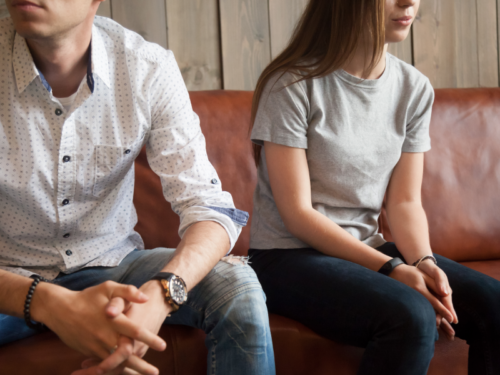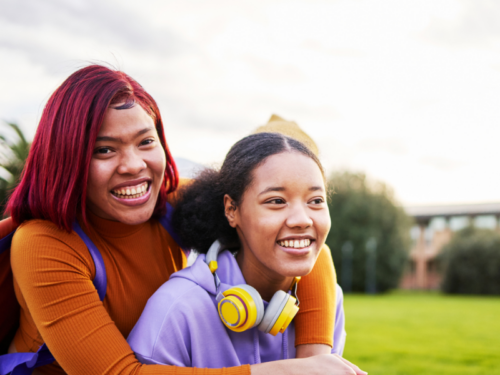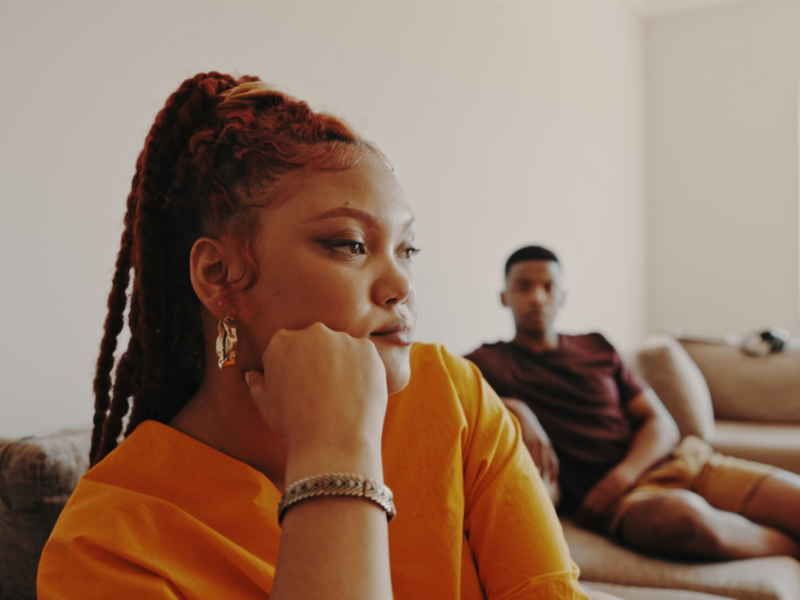
Table of Contents
Why Are Abusive Relationships So Hard to Leave?

Written By: Sarah duRivage-Jacobs

Clinically Reviewed By: Dr. Don Gasparini
October 20, 2023
7 min.
It takes an average of seven tries for survivors of intimate partner violence to leave their relationships. Here are some obstacles that make leaving abusive relationships difficult—and the process that makes it possible.
Learn more about our Clinical Review Process
Table of Contents
If you or someone you know is experiencing any type of abuse, call the National Domestic Violence Hotline at 1-800-799-7233 (SAFE) or 1-800-787-3224 (TTY) for anonymous, confidential help available 24/7.
When survivors of intimate partner violence (IPV) remain in abusive relationships, there’s often a misguided, though sometimes well-intentioned, follow-up question: Why did they stay? Although people are becoming increasingly aware of the difficulties of speaking out against abuse—partly due to the #MeToo movement—the question still comes up.
In 2014, that question became a Twitter hashtag after people learned that football player Ray Rice had been physically abusive toward his partner, Janay Rice. Thousands of IPV survivors took to social media to explain why they didn’t feel like they could leave their abusive partners with the hashtag #WhyIStayed. Here are some of their experiences.
- I just couldn’t afford to go. I opened my own bank account, he emptied it.
- I was taught “the course of true love never did run smooth,” and I almost took that quote to the grave.
- He scared me, I was too afraid to leave, I tried many times, but he threatened me and hurt me.
- Because both he and the world said that it wasn’t REAL abuse if he wasn’t leaving obvious, physical marks that people could see.
No one should judge someone’s reasons for staying in or leaving a relationship. Outsiders can’t understand the complexities or challenges of a relationship unless they’re in it. Leaving an abusive relationship is incredibly hard. According to the National Domestic Violence Hotline, an IPV survivor may try to leave their relationship an average of seven times before being successful. It’s a process—one that develops coping skills and resilience. To better understand this process and advocate for more compassion for survivors everywhere, we dug into research exploring the difficulties of leaving abusive partners.
Why is it difficult to leave an abusive relationship?
IPV may be more common than most people realize. Research shows that more than one in three people assigned female at birth and one in four people assigned male at birth are survivors of IPV. Over half of transgender and nonbinary individuals may experience IPV. Data among young people in relationships tells a similarly heartbreaking story: As many as one in 12 high schoolers may experience physical or sexual violence.

Mental health support for survivors.
Connect with our team of expert trauma-informed therapists to start healing today.
No two experiences of IPV are the same, which means no two survivors will face exactly the same obstacles when trying to end abusive relationships. Here are some of the common themes that have come out of the research.
Financial security
Finances are one of the primary reasons people stay in abusive relationships, research shows. Some people may have very limited resources of their own, such as income, employment, or education. As a result, there are very few alternative options to the situation they’re in.
Children
Studies show that the more someone has invested in their families and lives, the more difficult leaving an abusive relationship may be. When survivors of IPV have children, the reality of raising them on their own may be overwhelming. Survivors may also fear losing custody of the children to their abusive partner or facing child welfare agencies.
Cultural norms and stereotypes
There are many ways in which someone’s identity or background can shape their response to IPV—a topic that’s been widely studied. In some cultures, ending a relationship or getting outside help may be looked down upon. Additionally, some cultures believe in traditional gender roles, which may put pressure on a survivor of IPV to keep the family together—or make them especially dependent on their partners for financial support.
Stereotypes or “information myths” may also play into survivors’ decisions, like the survivor being at fault or physical abuse being the only legitimate type of IPV. Both of these false beliefs make it harder for survivors to feel confident and comfortable speaking out about what they’ve experienced. Language barriers can also make it difficult for non-English-speaking survivors to find resources that can help them rebuild their lives outside of their abusive partners.
Nature of abuse and fear of violence
The kinds of abuse a survivor has experienced may influence how possible it is to leave the relationship, data shows. Physical abuse may encourage some people to leave or make the idea of leaving feel even more dangerous. The same is true with verbal and emotional abuse—it may make leaving easier for some and harder for others.
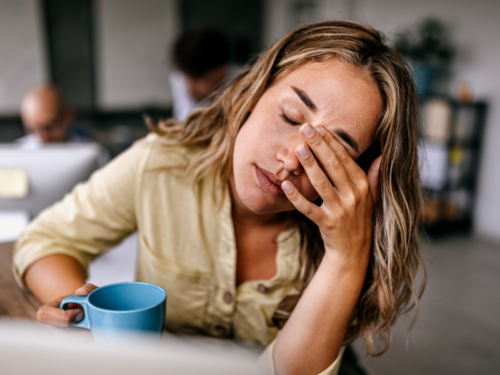
Here’s How Intimate Partner Violence Impacts Survivors’ Mental Health
Sarah duRivage-Jacobs
Fear of institutional harm
The criminal justice system is often in charge of responding to IPV allegations, which research shows can impact peoples’ ability to leave abusive relationships. Within communities of color, this may pose a significant barrier to seeking support because of personal or collective experiences of discrimination by the police or the broader legal system.
People whose immigration status is undocumented may distrust the system and fear deportation as a result of getting help. IPV survivors who came to the U.S. with their partners may be particularly dependent on their relationships because their immigration status was sponsored by their partners.
Lack of supportive services
IPV survivors who identify as LGBTQIA+ encounter very few supportive services that acknowledge the dynamics of LGBTQ+ relationships or the internalization of discrimination, according to studies. For LGBTQ+ and non-LGBTQ+ survivors who were assigned male at birth, fears of bias and not being believed may stand in the way of getting help.
Trauma bonding
IPV survivors may develop very strong emotional bonds with abusive partners because of the cycle of trauma and affection. Research shows that this trauma bonding may make it harder for survivors to leave or make them more likely to return to the relationship.
A similar concept is when survivors begin to identify with their abusers as a survival mechanism. While this can help them get through experiences of IPV, it may also make separating from an abusive partner more challenging.
How do IPV survivors leave abusive relationships?
The authors of a 2003 empirical review of the predictors of leaving abusive relationships found it was a complex, multiphase process. Here’s the process by which IPV survivors leave abusive relationships, according to their research:
Phase 1
The first phase involves emotional “leaving” before the physical leaving can take place. In this phase, survivors learn how to deal with the abuse while disconnecting from themselves and the people around them.
Phase 2
The second phase encompasses acknowledging the abuse, beginning to reframe it, and finding ways to counteract it.
Phase 3
The third phase is about survivors breaking free from the abuse, disengaging from it, and focusing on their own needs.
Phase 4
In the fourth phase, survivors face the aftermath of leaving abusive relationships and begin to rebuild their lives without their partners.
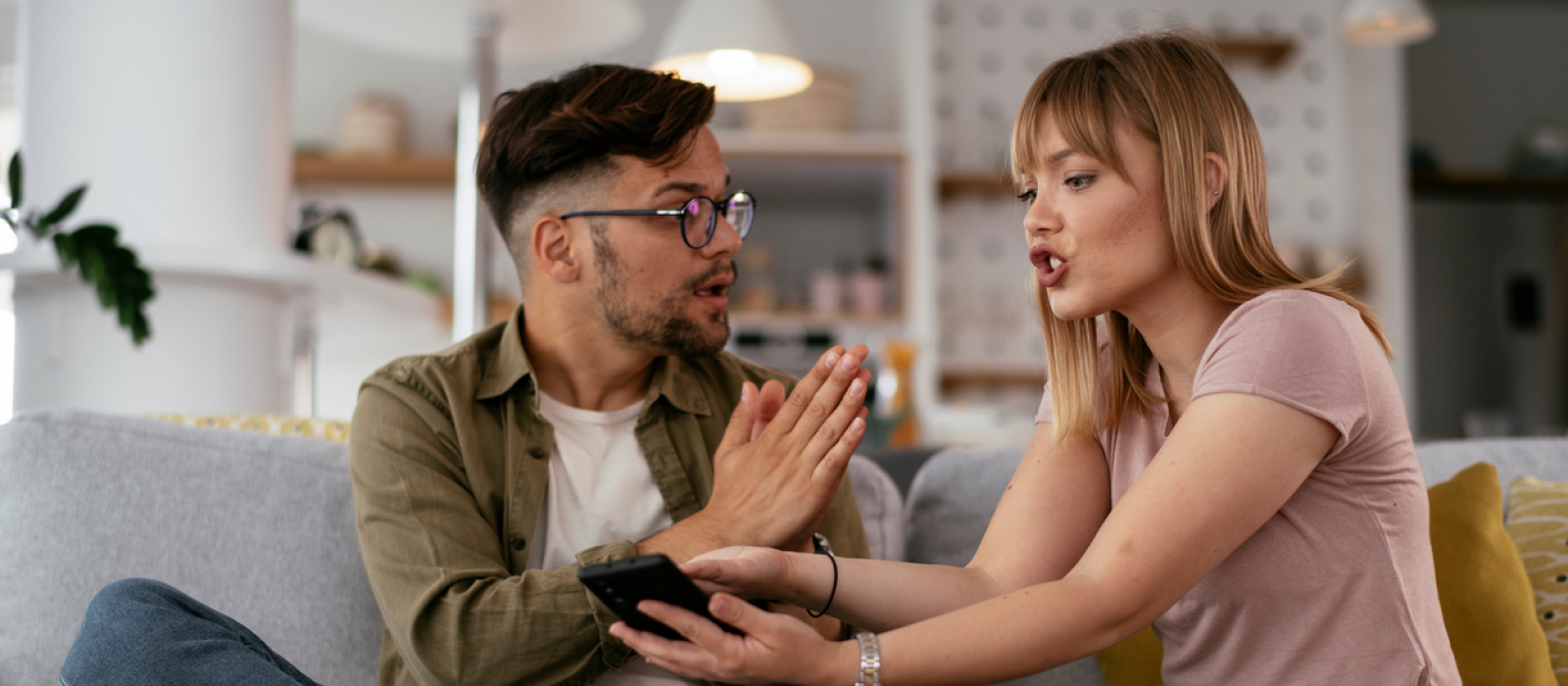
As the authors of the paper wrote: “There seems to be an assumption, with a few exceptions … that the only way a woman can regain her agency is to leave and that staying is always unhealthy.” But that’s an overly simplistic and judgmental way to view things. Throughout the process, even as survivors remain in abusive relationships, they are laying the emotional and logistical groundwork for separation. It’s a process that’s often filled with agency and resilience.
Trauma-informed mental healthcare for survivors at Charlie Health
Survivors of IPV and other forms of trauma can find compassionate, nonjudgmental support through Charlie Health’s virtual Intensive Outpatient Program (IOP) for young people. Our mental health providers are trauma-informed and specialize in a range of effective therapeutic modalities for the challenging mental health symptoms experienced during and after complex trauma or traumatic events, including cognitive behavioral therapy (CBT).
Charlie Health’s IOP offers a higher level of care than traditional once-weekly therapy. We connect young people with individual therapy, supported groups of peers with similar experiences, and family therapy. Together, these care components help our clients manage distressing symptoms, strengthen coping skills and resilience, and work toward their personal goals.
With Charlie Health’s virtual IOP, young people can engage in trauma-informed and clinically effective mental healthcare without missing school, work, or other daily obligations or activities. We make treatment more accessible by accepting most major insurance and many state Medicaid plans.
Think Charlie Health might be right for you or a loved one? Fill out a quick form to get in touch today. Our Care Team is available 24/7 to help you get started.
Additional resources for IPV survivors
If you or someone you know is experiencing IPV, there are resources available that can help with safety and support:
- The Abused Deaf Women’s Advocacy Services
- Break the Cycle
- Casa de Esperanza
- The Domestic Violence Initiative
- INCITE! Women of Color Against Violence
- Manavi
- The National Child Abuse Hotline/Childhelp
- The National Center on Domestic Violence, Trauma & Mental Health
- The National Coalition Against Domestic Violence
- The National Dating Abuse Helpline
- The National Deaf Domestic Violence Hotline
- The National Domestic Violence Hotline
- The National Indigenous Women’s Resource Center
- The National Resource Center on Domestic Violence
- The National Sexual Assault Hotline
- Safe Horizon
- The Women’s Law Organization
References
https://pubmed.ncbi.nlm.nih.gov/30516411/
https://www.thehotline.org/resources/get-help-50-obstacles-to-leaving/
https://journals.sagepub.com/doi/10.1177/1524838002250769
https://link.springer.com/article/10.1007/s10896-010-9326-4
https://journals.sagepub.com/doi/10.1177/1077801202239006
https://journals.sagepub.com/doi/10.1177/0886260518816325
https://www.ncbi.nlm.nih.gov/pmc/articles/PMC9709555/
https://www.psychiatry.org/patients-families/domestic-violence
https://www.nsvrc.org/sites/default/files/publications/2019-02/Transgender_infographic_508_0.pdf
https://www.cdc.gov/violenceprevention/intimatepartnerviolence/teendatingviolence/fastfact.html
